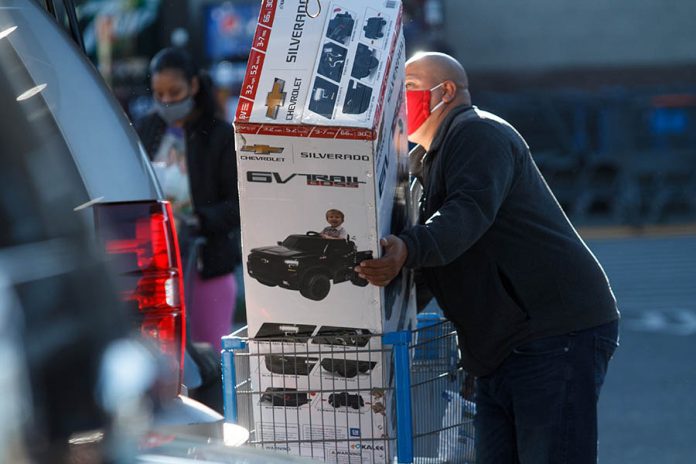Black Friday shopping is not nearly as frenzied this year – Valley News

Like the rest of the nation, the typical frenzied rush of shoppers camping out overnight and waiting in long lines associated with Black Friday in America didn’t quite materialize in southwest Riverside County this year.
Another victim of the COVID-19 pandemic, along with widespread adoption of online shopping by the U.S. consumers, Black Friday resembled most other Saturdays during the holiday shopping season.
“Shoppers are spreading out their shopping throughout the holiday season because of concerns about social distancing and the pandemic,” Brian Field of Sensormatic Solutions said. “This was compounded by retailers not offering as many in-store doorbusters and the increasing adoption of e-commerce.”
While shoppers did head out in the early morning hours to wait in line to buy gifts on their holiday lists, they did so with a more targeted approach.
Local shoppers said instead of visiting a half dozen stores on Black Friday, they would be more cautious in avoiding lines and large gatherings at shops and focus on picking up items they were committed to purchasing instead of broadly browsing the deals.
“We used to spend all day out shopping on Black Friday. It’s a family tradition,” Temecula’s Jorge Ramirez said. “This time, we are just getting the big items that we need and being careful about where we go. But we miss it; it was a fun thing to do every year.”
Ramirez said because retailers have offered deals well in advance of Black Friday, the family is way ahead on their holiday shopping.
Others took advantage of the curbside delivery model adopted by many retailers since the pandemic began, allowing customers to pull up to the curb, open their trunks and have their items delivered to them after ordering from the retailer’s website.
“It’s just way easier,” Sharon Andrews of Aguanga said. “Why wait in line and go in and fight for something you want when you can just order it online?”
Still, others sought the therapeutic healing powers of retail shopping, and while parking lots were full, the sense of frenzied consumerism that usually accompanies the day was missing.
Nationally, preliminary numbers indicate that traffic at retail stores Friday dropped by 52.1% according to Sensormatic Solutions. Shopper traffic also decreased 45.2% Sunday, Nov. 22, through Friday, Nov. 27, compared to the same time last year, according to Johnson Controls.
This year, due to the pandemic, most retailers limited their Black Friday hours, but Johnson Controls said the busiest time of the day was 2 p.m., similar to years past.
Thanksgiving Day shopping dropped 94.9% compared to 2019.
On the flip side, online spending on Black Friday posted a record, increasing by 21.6% said Adobe Analytics. They said shoppers dropped $9 billion in online purchases, making Friday the second-largest online spending day in U.S. history, second only to Cyber Monday 2019, according to Adobe.
Cyber Monday 2020, which took place Monday, Nov. 27, after press time, was expected to shatter that record, with Adobe estimating that between $10.8 billion and $12.7 billion would be spent.
The National Retail Federation forecasted that sales during the months of November and December would increase overall, with spending landing somewhere between $755.3 billion and $766.7 billion.
“This holiday season will be unlike any other,” Matthew Shay, CEO and president of NRF, said in the organization’s holiday shopping report.
“Given the pandemic, there is uncertainty about consumers’ willingness to spend, but with the economy improving most have the ability to spend,” Jack Kleinhenz, chief economist of NRF, said. “Consumers have experienced a difficult year but will likely spend more than anyone would have expected just a few months ago.
“After all they’ve been through, we think there’s going to be a psychological factor that they owe it to themselves and their families to have a better-than-normal holiday. There are risks to the economy if the virus continues to spread, but as long as consumers remain confident and upbeat, they will spend for the holiday season,” he said.
According to NRF, roughly 59% of shoppers had already started their holiday shopping by early November and Adobe said shoppers spent about $5.1 billion online Thanksgiving Day, an increase of $4.2 billion over last year.
“What’s important is that by staying at home people don’t spend as much as they would have under normal circumstances so the savings are much higher than what they would have been otherwise,” Raymond Sfeir, director of the A. Gary Anderson Center for Economic Research at Chapman University, told City News Service.
“Now the personal savings are over $1 trillion more than at the beginning of the year,” he said.
In April, the “saving grade” of disposable income was 33.7%, Sfeir said.
“People saved $1 out of $3, that’s huge,” he said.
It means people are expected to spend more this year.
“There has been more spending on goods than services,” Sfeir said. “Because people are staying at home, they’re ordering online for goods.”
However, the year has been a tale of two cities for the upper and lower classes, Sfeir said.
“The ones who are unemployed and really hurt are the ones who are getting minimum wage,” Sfeir said. “Those who work in restaurants or cafes or hotels. These are at the bottom scale of the salaries. These are the people who have been hurt and have relied on unemployment and (a stimulus) check from the government. There’s one chunk of people doing fine and another portion not doing very well.”
But the people who hung on to their jobs are coping well, he said.
“That’s why you see consumption going up,” he said. “That’s because of pent-up demand.”
As for what’s to come, Sensormatic Solutions is predicting that the 10 busiest days of 2020 will culminate in 34.2% of holiday traffic, down from 46.5% in 2019.
“As we approach Super Saturday, Dec. 19, and corresponding shipping deadlines, we expect to see some of the in-store traffic that didn’t materialize on Black Friday appear as consumers wrap up their holiday shopping and make last-minute purchases,” Field said.
City News Service contributed to this report.
Jeff Pack can be reached by email at jpack@reedermedia.com.
Published at Sat, 05 Dec 2020 03:01:37 +0000





Comments
Loading…